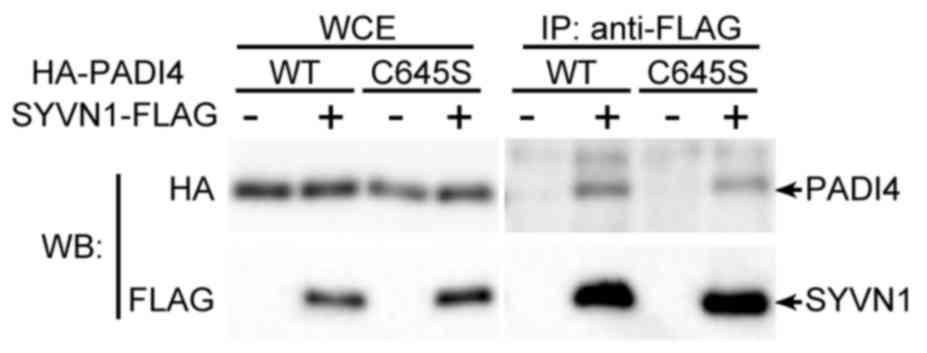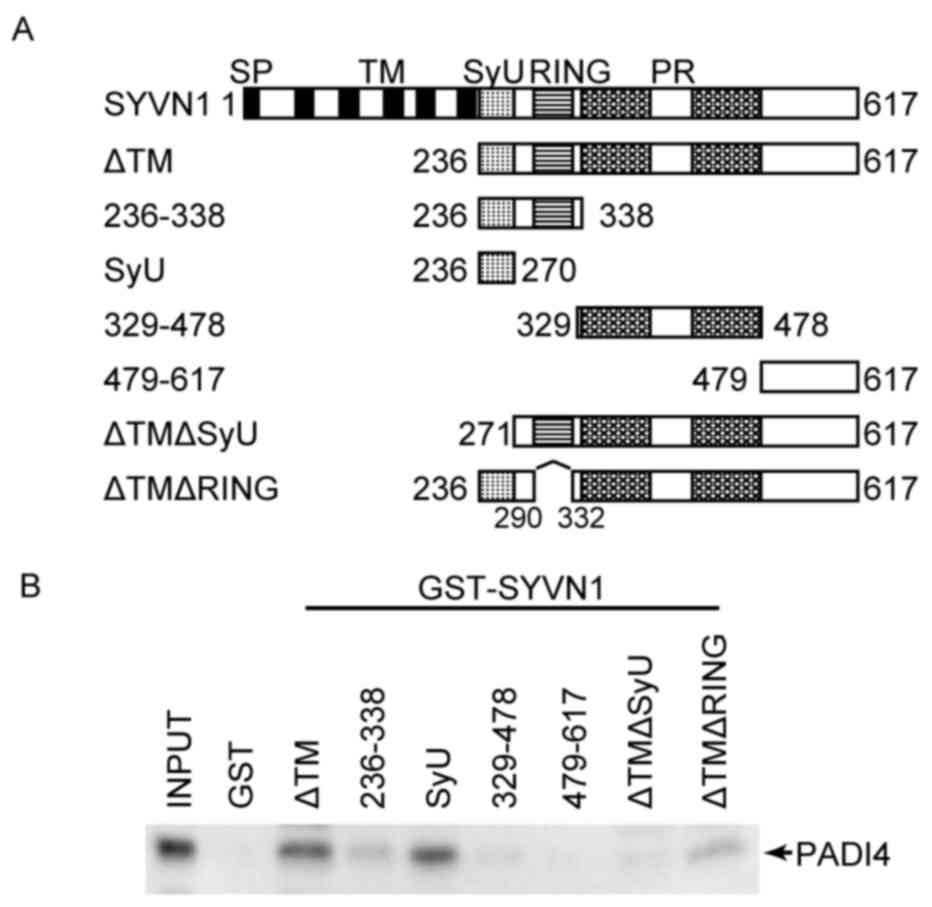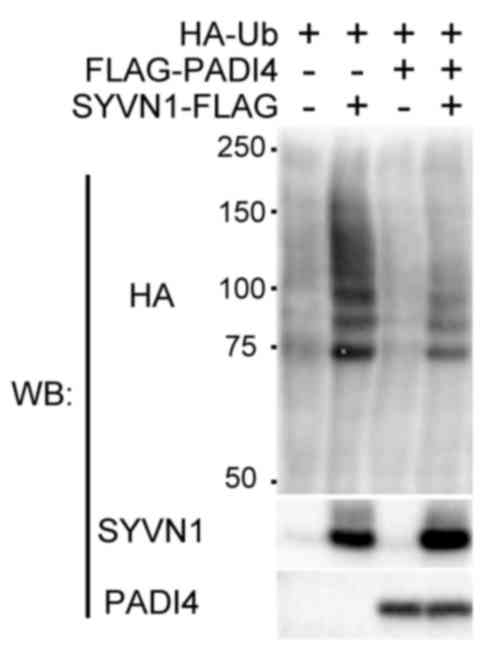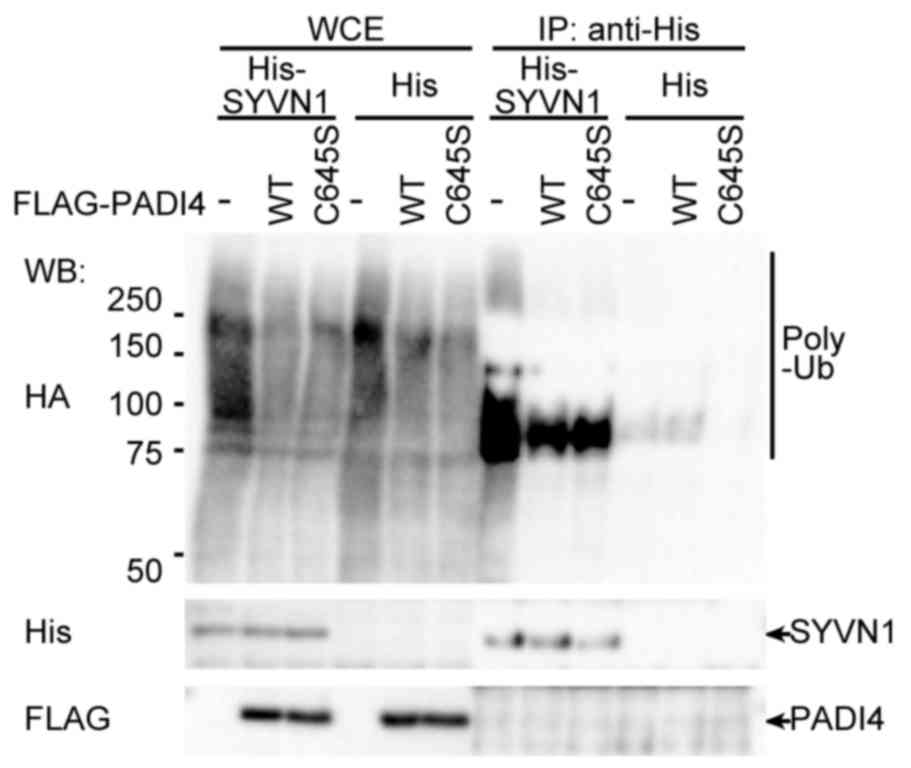|
1
|
Harris ED Jr: Rheumatoid arthritis.
Pathophysiology and implications for therapy. N Engl J Med.
322:1277–1289. 1990. View Article : Google Scholar : PubMed/NCBI
|
|
2
|
Feldmann M, Brennan FM and Maini RN:
Rheumatoid arthritis. Cell. 85:307–310. 1996. View Article : Google Scholar : PubMed/NCBI
|
|
3
|
Aletaha D, Neogi T, Silman AJ, Funovits J,
Felson DT, Bingham CO III, Birnbaum NS, Burmester GR, Bykerk VP,
Cohen MD, et al: 2010 Rheumatoid arthritis classification criteria:
An American college of rheumatology/European league against
rheumatism collaborative initiative. Arthritis Rheum. 62:2569–2581.
2010. View Article : Google Scholar : PubMed/NCBI
|
|
4
|
Gabriel SE: The epidemiology of rheumatoid
arthritis. Rheum Dis Clin North Am. 27:269–281. 2001. View Article : Google Scholar : PubMed/NCBI
|
|
5
|
Smolen JS and Aletaha D: Rheumatoid
arthritis therapy reappraisal: Strategies, opportunities and
challenges. Nat Rev Rheumatol. 11:276–289. 2015. View Article : Google Scholar : PubMed/NCBI
|
|
6
|
Yang XJ: Multisite protein modification
and intramolecular signaling. Oncogene. 24:1653–1662. 2005.
View Article : Google Scholar : PubMed/NCBI
|
|
7
|
Yamada R, Suzuki A, Chang X and Yamamoto
K: Citrullinated proteins in rheumatoid arthritis. Front Biosci.
10:54–64. 2005. View
Article : Google Scholar : PubMed/NCBI
|
|
8
|
Martin-Mola E, Balsa A, Garcia-Vicuna R,
Gómez-Reino J, González-Gay MA, Sanmartí R and Loza E:
Anti-citrullinated peptide antibodies and their value for
predicting responses to biologic agents: A review. Rheumatol Int.
36:1043–1063. 2016. View Article : Google Scholar : PubMed/NCBI
|
|
9
|
Aggarwal R, Liao K, Nair R, Ringold S and
Costenbader KH: Anti-citrullinated peptide antibody assays and
their role in the diagnosis of rheumatoid arthritis. Arthritis
Rheum. 61:1472–1483. 2009. View Article : Google Scholar : PubMed/NCBI
|
|
10
|
van Venrooij WJ and Pruijn GJ:
Citrullination: A small change for a protein with great
consequences for rheumatoid arthritis. Arthritis Res. 2:249–251.
2000. View Article : Google Scholar : PubMed/NCBI
|
|
11
|
Tarcsa E, Marekov LN, Mei G, Melino G, Lee
SC and Steinert PM: Protein unfolding by peptidylarginine
deiminase. Substrate specificity and structural relationships of
the natural substrates trichohyalin and filaggrin. J Biol Chem.
271:30709–30716. 1996. View Article : Google Scholar : PubMed/NCBI
|
|
12
|
Vossenaar ER, Zendman AJ, van Venrooij WJ
and Pruijn GJ: PAD, a growing family of citrullinating enzymes:
Genes, features and involvement in disease. Bioessays.
25:1106–1118. 2003. View Article : Google Scholar : PubMed/NCBI
|
|
13
|
Klareskog L, Rönnelid J, Lundberg K,
Padyukov L and Alfredsson L: Immunity to citrullinated proteins in
rheumatoid arthritis. Annu Rev Immunol. 26:651–675. 2008.
View Article : Google Scholar : PubMed/NCBI
|
|
14
|
Schellekens GA, de Jong BA, van den Hoogen
FH, van de Putte LB and van Venrooij WJ: Citrulline is an essential
constituent of antigenic determinants recognized by rheumatoid
arthritis-specific autoantibodies. J Clin Invest. 101:273–281.
1998. View
Article : Google Scholar : PubMed/NCBI
|
|
15
|
Schellekens GA, Visser H, de Jong BA, van
den Hoogen FH, Hazes JM, Breedveld FC and van Venrooij WJ: The
diagnostic properties of rheumatoid arthritis antibodies
recognizing a cyclic citrullinated peptide. Arthritis Rheum.
43:155–163. 2000. View Article : Google Scholar : PubMed/NCBI
|
|
16
|
Mrabet D, Laadhar L, Haouet S, Sahli H,
Zouari B, Makni S and Sellami S: Anomalies of intra-synovial
citrullination: Is there any interest in the diagnosis of early
rheumatoid arthritis? Rheumatol Int. 33:787–791. 2013. View Article : Google Scholar : PubMed/NCBI
|
|
17
|
Ikari K, Kuwahara M, Nakamura T, Momohara
S, Hara M, Yamanaka H, Tomatsu T and Kamatani N: Association
between PADI4 and rheumatoid arthritis: A replication study.
Arthritis Rheum. 52:3054–3057. 2005. View Article : Google Scholar : PubMed/NCBI
|
|
18
|
Foulquier C, Sebbag M, Clavel C,
Chapuy-Regaud S, Al Badine R, Méchin MC, Vincent C, Nachat R,
Yamada M, Takahara H, et al: Peptidyl arginine deiminase type
2(PAD-2) and PAD-4 but not PAD-1, PAD-3, and PAD-6 are expressed in
rheumatoid arthritis synovium in close association with tissue
inflammation. Arthritis Rheum. 56:3541–3553. 2007. View Article : Google Scholar : PubMed/NCBI
|
|
19
|
Chang X, Xia Y, Pan J, Meng Q, Zhao Y and
Yan X: PADI2 is significantly associated with rheumatoid arthritis.
PLoS One. 8:e812592013. View Article : Google Scholar : PubMed/NCBI
|
|
20
|
Anzilotti C, Pratesi F, Tommasi C and
Migliorini P: Peptidylarginine deiminase 4 and citrullination in
health and disease. Autoimmun Rev. 9:158–160. 2010. View Article : Google Scholar : PubMed/NCBI
|
|
21
|
Jones JE, Causey CP, Knuckley B,
Slack-Noyes JL and Thompson PR: Protein arginine deiminase 4
(PAD4): Current understanding and future therapeutic potential.
Curr Opin Drug Discov Devel. 12:616–627. 2009.PubMed/NCBI
|
|
22
|
Suzuki A, Yamada R, Chang X, Tokuhiro S,
Sawada T, Suzuki M, Nagasaki M, Nakayama-Hamada M, Kawaida R, Ono
M, et al: Functional haplotypes of PADI4, encoding citrullinating
enzyme peptidylarginine deiminase 4, are associated with rheumatoid
arthritis. Nat Genet. 34:395–402. 2003. View Article : Google Scholar : PubMed/NCBI
|
|
23
|
Chang X, Yamada R, Suzuki A, Sawada T,
Yoshino S, Tokuhiro S and Yamamoto K: Localization of
peptidylarginine deiminase 4 (PADI4) and citrullinated protein in
synovial tissue of rheumatoid arthritis. Rheumatology (Oxford).
44:40–50. 2005. View Article : Google Scholar : PubMed/NCBI
|
|
24
|
Mastronardi FG, Wood DD, Mei J, Raijmakers
R, Tseveleki V, Dosch HM, Probert L, Casaccia-Bonnefil P and
Moscarello MA: Increased citrullination of histone H3 in multiple
sclerosis brain and animal models of demyelination: A role for
tumor necrosis factor-induced peptidylarginine deiminase 4
translocation. J Neurosci. 26:11387–11396. 2006. View Article : Google Scholar : PubMed/NCBI
|
|
25
|
Cuthbert GL, Daujat S, Snowden AW,
Erdjument-Bromage H, Hagiwara T, Yamada M, Schneider R, Gregory PD,
Tempst P, Bannister AJ and Kouzarides T: Histone deimination
antagonizes arginine methylation. Cell. 118:545–553. 2004.
View Article : Google Scholar : PubMed/NCBI
|
|
26
|
Wang Y, Wysocka J, Sayegh J, Lee YH,
Perlin JR, Leonelli L, Sonbuchner LS, McDonald CH, Cook RG, Dou Y,
et al: Human PAD4 regulates histone arginine methylation levels via
demethylimination. Science. 306:279–283. 2004. View Article : Google Scholar : PubMed/NCBI
|
|
27
|
Wang Y, Li M, Stadler S, Correll S, Li P,
Wang D, Hayama R, Leonelli L, Han H, Grigoryev SA, et al: Histone
hypercitrullination mediates chromatin decondensation and
neutrophil extracellular trap formation. J Cell Biol. 184:205–213.
2009. View Article : Google Scholar : PubMed/NCBI
|
|
28
|
Li P, Li M, Lindberg MR, Kennett MJ, Xiong
N and Wang Y: PAD4 is essential for antibacterial innate immunity
mediated by neutrophil extracellular traps. J Exp Med.
207:1853–1862. 2010. View Article : Google Scholar : PubMed/NCBI
|
|
29
|
Tanikawa C, Ueda K, Nakagawa H, Yoshida N,
Nakamura Y and Matsuda K: Regulation of protein Citrullination
through p53/PADI4 network in DNA damage response. Cancer Res.
69:8761–8769. 2009. View Article : Google Scholar : PubMed/NCBI
|
|
30
|
Yoo SA, You S, Yoon HJ, Kim DH, Kim HS,
Lee K, Ahn JH, Hwang D, Lee AS, Kim KJ, et al: A novel pathogenic
role of the ER chaperone GRP78/BiP in rheumatoid arthritis. J Exp
Med. 209:871–886. 2012. View Article : Google Scholar : PubMed/NCBI
|
|
31
|
Manié SN, Lebeau J and Chevet E: Cellular
mechanisms of endoplasmic reticulum stress signaling in health and
disease. 3. Orchestrating the unfolded protein response in
oncogenesis: An update. Am J Physiol Cell Physiol. 307:C901–C907.
2014. View Article : Google Scholar : PubMed/NCBI
|
|
32
|
Hotamisligil GS and Erbay E: Nutrient
sensing and inflammation in metabolic diseases. Nat Rev Immunol.
8:923–934. 2008. View Article : Google Scholar : PubMed/NCBI
|
|
33
|
Park YJ, Yoo SA and Kim WU: Role of
endoplasmic reticulum stress in rheumatoid arthritis pathogenesis.
J Korean Med Sci. 29:2–11. 2014. View Article : Google Scholar : PubMed/NCBI
|
|
34
|
Gao B, Lee SM, Chen A, Zhang J, Zhang DD,
Kannan K, Ortmann RA and Fang D: Synoviolin promotes IRE1
ubiquitination and degradation in synovial fibroblasts from mice
with collagen-induced arthritis. EMBO Rep. 9:480–485. 2008.
View Article : Google Scholar : PubMed/NCBI
|
|
35
|
Connor AM, Mahomed N, Gandhi R, Keystone
EC and Berger SA: TNFα modulates protein degradation pathways in
rheumatoid arthritis synovial fibroblasts. Arthritis Res Ther.
14:R622012. View
Article : Google Scholar : PubMed/NCBI
|
|
36
|
Amano T, Yamasaki S, Yagishita N,
Tsuchimochi K, Shin H, Kawahara K, Aratani S, Fujita H, Zhang L,
Ikeda R, et al: Synoviolin/Hrd1, an E3 ubiquitin ligase, as a novel
pathogenic factor for arthropathy. Genes Dev. 17:2436–2449. 2003.
View Article : Google Scholar : PubMed/NCBI
|
|
37
|
Yamasaki S, Yagishita N, Sasaki T,
Nakazawa M, Kato Y, Yamadera T, Bae E, Toriyama S, Ikeda R, Zhang
L, et al: Cytoplasmic destruction of p53 by the endoplasmic
reticulum-resident ubiquitin ligase ‘Synoviolin’. Embo J.
26:113–122. 2007. View Article : Google Scholar : PubMed/NCBI
|
|
38
|
Yamasaki S, Yagishita N, Nishioka K and
Nakajima T: The roles of synoviolin in crosstalk between
endoplasmic reticulum stress-induced apoptosis and p53 pathway.
Cell Cycle. 6:1319–1323. 2007. View Article : Google Scholar : PubMed/NCBI
|
|
39
|
Toh ML, Marotte H, Blond JL, Jhumka U,
Eljaafari A, Mougin B and Miossec P: Overexpression of synoviolin
in peripheral blood and synoviocytes from rheumatoid arthritis
patients and continued elevation in nonresponders to infliximab
treatment. Arthritis Rheum. 54:2109–2118. 2006. View Article : Google Scholar : PubMed/NCBI
|
|
40
|
Klaasen R, Wijbrandts CA, van Kuijk AW,
Pots D, Gerlag DM and Tak PP: Synovial synoviolin in relation to
response to TNF blockade in patients with rheumatoid arthritis and
psoriatic arthritis. Ann Rheum Dis. 71:1260–1261. 2012. View Article : Google Scholar : PubMed/NCBI
|
|
41
|
Yagishita N, Yamasaki S, Nishioka K and
Nakajima T: Synoviolin, protein folding and the maintenance of
joint homeostasis. Nat Clin Pract Rheumatol. 4:91–97. 2008.
View Article : Google Scholar : PubMed/NCBI
|
|
42
|
Hasegawa D, Fujii R, Yagishita N,
Matsumoto N, Aratani S, Izumi T, Azakami K, Nakazawa M, Fujita H,
Sato T, et al: E3 ubiquitin ligase synoviolin is involved in liver
fibrogenesis. PLoS One. 5:e135902010. View Article : Google Scholar : PubMed/NCBI
|
|
43
|
Wu T, Zhao F, Gao B, Tan C, Yagishita N,
Nakajima T, Wong PK, Chapman E, Fang D and Zhang DD: Hrd1
suppresses Nrf2-mediated cellular protection during liver
cirrhosis. Genes Dev. 28:708–722. 2014. View Article : Google Scholar : PubMed/NCBI
|
|
44
|
Nakajima F, Aratani S, Fujita H, Yagishita
N, Ichinose S, Makita K, Setoguchi Y and Nakajima T: Synoviolin
inhibitor LS-102 reduces endoplasmic reticulum stress-induced
collagen secretion in an in vitro model of stress-related
interstitial pneumonia. Int J Mol Med. 35:110–116. 2015. View Article : Google Scholar : PubMed/NCBI
|
|
45
|
Fujita H, Yagishita N, Aratani S,
Saito-Fujita T, Morota S, Yamano Y, Hansson MJ, Inazu M, Kokuba H,
Sudo K, et al: The E3 ligase synoviolin controls body weight and
mitochondrial biogenesis through negative regulation of PGC-1β.
EMBO J. 34:1042–1055. 2015. View Article : Google Scholar : PubMed/NCBI
|
|
46
|
Yagishita N, Aratani S, Leach C, Amano T,
Yamano Y, Nakatani K, Nishioka K and Nakajima T: RING-finger type
E3 ubiquitin ligase inhibitors as novel candidates for the
treatment of rheumatoid arthritis. Int J Mol Med. 30:1281–1286.
2012. View Article : Google Scholar : PubMed/NCBI
|
|
47
|
Arita K, Hashimoto H, Shimizu T, Nakashima
K, Yamada M and Sato M: Structural basis for Ca(2+)-induced
activation of human PAD4. Nat Struct Mol Biol. 11:777–783. 2004.
View Article : Google Scholar : PubMed/NCBI
|
|
48
|
Knuckley B, Bhatia M and Thompson PR:
Protein arginine deiminase 4: Evidence for a reverse protonation
mechanism. Biochemistry. 46:6578–6587. 2007. View Article : Google Scholar : PubMed/NCBI
|
|
49
|
Vossenaar ER, Nijenhuis S, Helsen MM, Van
der Heijden A, Senshu T, van den Berg WB, van Venrooij WJ and
Joosten LA: Citrullination of synovial proteins in murine models of
rheumatoid arthritis. Arthritis Rheum. 48:2489–2500. 2003.
View Article : Google Scholar : PubMed/NCBI
|
|
50
|
Raijmakers R, Zendman AJ, Egberts WV,
Vossenaar ER, Raats J, Soede-Huijbregts C, Rutjes FP, van Veelen
PA, Drijfhout JW and Pruijn GJ: Methylation of arginine residues
interferes with citrullination by peptidylarginine deiminases in
vitro. J Mol Biol. 367:1118–1129. 2007. View Article : Google Scholar : PubMed/NCBI
|
|
51
|
Butler PL, Staruschenko A and Snyder PM:
Acetylation stimulates the epithelial sodium channel by reducing
its ubiquitination and degradation. J Biol Chem. 290:12497–13503.
2015. View Article : Google Scholar : PubMed/NCBI
|
|
52
|
Rondas D, Crèvecoeur I, D'Hertog W,
Ferreira GB, Staes A, Garg AD, Eizirik DL, Agostinis P, Gevaert K,
Overbergh L and Mathieu C: Citrullinated glucose-regulated protein
78 is an autoantigen in type 1 diabetes. Diabetes. 64:573–586.
2015. View Article : Google Scholar : PubMed/NCBI
|
|
53
|
Skriner K, Adolph K, Jungblut PR and
Burmester GR: Association of citrullinated proteins with synovial
exosomes. Arthritis Rheum. 54:3809–3814. 2006. View Article : Google Scholar : PubMed/NCBI
|
|
54
|
Goëb V, Thomas-L'Otellier M, Daveau R,
Charlionet R, Fardellone P, Le Loët X, Tron F, Gilbert D and
Vittecoq O: Candidate autoantigens identified by mass spectrometry
in early rheumatoid arthritis are chaperones and citrullinated
glycolytic enzymes. Arthritis Res Ther. 11:R382009. View Article : Google Scholar : PubMed/NCBI
|
|
55
|
Yamasaki S, Yagishita N, Tsuchimochi K,
Kato Y, Sasaki T, Amano T, Beppu M, Aoki H, Nakamura H, Nishioka K
and Nakajima T: Resistance to endoplasmic reticulum stress is an
acquired cellular characteristic of rheumatoid synovial cells. Int
J Mol Med. 18:113–117. 2006.PubMed/NCBI
|
|
56
|
Yao H, Li P, Venters BJ, Zheng S, Thompson
PR, Pugh BF and Wang Y: Histone Arg modifications and p53 regulate
the expression of OKL38, a mediator of apoptosis. J Biol Chem.
283:20060–20068. 2008. View Article : Google Scholar : PubMed/NCBI
|
|
57
|
Li P, Yao H, Zhang Z, Li M, Luo Y,
Thompson PR, Gilmour DS and Wang Y: Regulation of p53 target gene
expression by peptidylarginine deiminase 4. Mol Cell Biol.
28:4745–4758. 2008. View Article : Google Scholar : PubMed/NCBI
|
|
58
|
Tanikawa C, Espinosa M, Suzuki A, Masuda
K, Yamamoto K, Tsuchiya E, Ueda K, Daigo Y, Nakamura Y and Matsuda
K: Regulation of histone modification and chromatin structure by
the p53-PADI4 pathway. Nat Commun. 3:6762012. View Article : Google Scholar : PubMed/NCBI
|
|
59
|
Liu GY, Liao YF, Chang WH, Liu CC, Hsieh
MC, Hsu PC, Tsay GJ and Hung HC: Overexpression of peptidylarginine
deiminase IV features in apoptosis of haematopoietic cells.
Apoptosis. 11:183–196. 2006. View Article : Google Scholar : PubMed/NCBI
|
|
60
|
Seri Y, Shoda H, Suzuki A, Matsumoto I,
Sumida T, Fujio K and Yamamoto K: Peptidylarginine deiminase type 4
deficiency reduced arthritis severity in a glucose-6-phosphate
isomerase-induced arthritis model. Sci Rep. 5:130412015. View Article : Google Scholar : PubMed/NCBI
|
|
61
|
Moran M, Fang C and Paul A: Rheumatoid
arthritis presenting as an invasive soft-tissue tumour. Arch Orthop
Trauma Surg. 122:538–540. 2002. View Article : Google Scholar : PubMed/NCBI
|
|
62
|
Nakajima T, Aono H, Hasunuma T, Yamamoto
K, Shirai T, Hirohata K and Nishioka K: Apoptosis and functional
Fas antigen in rheumatoid arthritis synoviocytes. Arthritis Rheum.
38:485–491. 1995. View Article : Google Scholar : PubMed/NCBI
|
|
63
|
Nobunaga M: Malignant rheumatoid
arthritis. Nihon Rinsho. 50:597–602. 1992.(In Japanese). PubMed/NCBI
|
|
64
|
Khandpur R, Carmona-Rivera C,
Vivekanandan-Giri A, Gizinski A, Yalavarthi S, Knight JS, Friday S,
Li S, Patel RM, Subramanian V, et al: NETs are a source of
citrullinated autoantigens and stimulate inflammatory responses in
rheumatoid arthritis. Sci Transl Med. 5:178ra402013. View Article : Google Scholar : PubMed/NCBI
|
|
65
|
Dwivedi N, Upadhyay J, Neeli I, Khan S,
Pattanaik D, Myers L, Kirou KA, Hellmich B, Knuckley B, Thompson
PR, et al: Felty's syndrome autoantibodies bind to deiminated
histones and neutrophil extracellular chromatin traps. Arthritis
Rheum. 64:982–992. 2012. View Article : Google Scholar : PubMed/NCBI
|
|
66
|
Spengler J, Lugonja B, Ytterberg A Jimmy,
Zubarev RA, Creese AJ, Pearson MJ, Grant MM, Milward M, Lundberg K,
Buckley CD, et al: Release of active peptidyl arginine deiminases
by neutrophils can explain production of extracellular
citrullinated autoantigens in rheumatoid arthritis synovial fluid.
Arthritis Rheumatol. 67:3135–3145. 2015. View Article : Google Scholar : PubMed/NCBI
|
|
67
|
Li L, Shen Y, Ding Y, Liu Y, Su D and
Liang X: Hrd1 participates in the regulation of collagen I
synthesis in renal fibrosis. Mol Cell Biochem. 386:35–44. 2014.
View Article : Google Scholar : PubMed/NCBI
|
|
68
|
Toh ML, Gonzales G, Koenders MI, Tournadre
A, Boyle D, Lubberts E, Zhou Y, Firestein GS, van den Berg WB and
Miossec P: Role of interleukin 17 in arthritis chronicity through
survival of synoviocytes via regulation of synoviolin expression.
PLoS One. 5:e134162010. View Article : Google Scholar : PubMed/NCBI
|
|
69
|
Burr ML, van den Boomen DJ, Bye H,
Antrobus R, Wiertz EJ and Lehner PJ: MHC class I molecules are
preferentially ubiquitinated on endoplasmic reticulum luminal
residues during HRD1 ubiquitin E3 ligase-mediated dislocation. Proc
Natl Acad Sci USA. 110:pp. 14290–14295. 2013; View Article : Google Scholar : PubMed/NCBI
|
|
70
|
Bianchini E, Fanin M, Mamchaoui K, Betto R
and Sandonà D: Unveiling the degradative route of the V247M
α-sarcoglycan mutant responsible for LGMD-2D. Hum Mol Genet.
23:3746–3758. 2014. View Article : Google Scholar : PubMed/NCBI
|


















